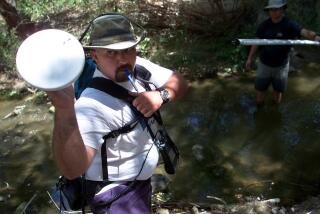Marc Alan Lappe, 62; Ethicist Fought for Cleaner Environment
- Share via
Marc Alan Lappe, a toxicologist, author and medical ethicist who fought for public policies that promote a clean and healthy environment, died Saturday. He was 62.
Lappe was diagnosed with brain cancer in August and died at his home in Gualala, Calif., said his son, Anthony.
An outspoken advocate of ethics in public health policies, Lappe was a founding fellow of the Hastings Center in New York in 1969, the first bioethics institute to explore emerging questions related to health and the environment.
More recently, he was founder and director of the Center for Ethics and Toxics in Gualala, which is dedicated to preventing the use of toxic herbicides, pesticides and other dangerous substances near vulnerable populations.
Lappe was a frequent expert witness on a range of controversial issues involving environmental contamination and physical device failure.
As a consultant to the Food and Drug Administration on the safety of silicone-gel breast implants starting in the 1980s, he testified in a number of court cases as an expert on silicone-induced immune disorders. His testimonies for the plaintiffs helped lead to a $3.2-billion settlement in 1992 by Dow Corning Corp., the maker of the implants. That year, the FDA banned the sale of silicone-gel implants.
Earlier, as director of California’s hazard assessment department, Lappe was chief author of a 1980 study about the use of Malathion to eradicate medflies in the state. He argued against aerial spraying of the pesticide because the long-range effects had not been fully studied.
When state health officials rejected his criticism, Lappe turned over his memo on the potential health risks to environmental groups. He was then removed from his post as director of the department.
Brilliant, stubborn and single-minded, in the opinion of some former colleagues, Lappe expressed his views in a number of books.
“Chemical Deception: The Toxic Threat to Health and the Environment” (1991) was specific about ways that chemicals affect human health. “The Tao of Immunology: A Revolutionary New Understanding of Our Body’s Defenses” (1997) proposed that antibiotics and vaccines are not the only way to boost the immune system.
He advocated a holistic approach, in cooperation with nature.
“Against the Grain: Biotechnology and the Corporate Takeover of Your Food” (1998) raised questions about the health and safety of genetically modified foods.
Lappe was also an educator who taught courses in ethics and public health policy at UC Berkeley from 1981 to 1986 and the University of Illinois at Chicago from 1988 to 1993. Most recently, he was an instructor at College of Marin. He also taught science at Pacific Community Charter School in Point Arena, Calif., which he helped found in 1998.
As director of the Center for Ethics and Toxics starting in 1992, Lappe was a leading voice in a number of public health debates.
In 1994, the center helped pass a referendum that banned the growth of genetically altered crops or animals in Mendocino County.
Born in Newark, N.J., Lappe graduated from Wesleyan University in Connecticut and earned a PhD in experimental pathology at the University of Pennsylvania.
He was married to Frances Moore Lappe, author of “Diet for a Small Planet” (1971), a bestselling book on nutrition and lifestyle. They had two children, Anthony and Anna, before they divorced in 1975.
Two years later he married Nichol Lovera, who died in 1996. The couple had three children, Matthew, Martine and Gina.
Along with his five children, he is survived by his third wife, Jacqueline Durbin; two stepchildren, Danielle and Sasha Spoor; his father, Paul; and a brother, Don.






